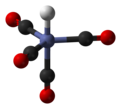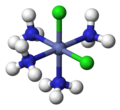the ligand cone angle (θ) is a measure of the steric bulk of a ligand in a transition metal coordination complex. It is defined as the solid angle formed...
9 KB (823 words) - 13:31, 16 February 2024
Steric effects (section Cone angles)
usually not useful. Ligand cone angles are measures of the size of ligands in coordination chemistry. It is defined as the solid angle formed with the metal...
11 KB (989 words) - 13:37, 29 September 2024
high basicity (pKa = 9.7) and a large ligand cone angle (170°). Important complexes containing P(Cy)3 ligands include the 2005 Nobel Prize-winning Grubbs'...
3 KB (154 words) - 05:32, 7 April 2023
boundary element method (BEM) Evaluating the size of ligands in metal complexes, see ligand cone angle Calculating the electric field and magnetic field...
28 KB (4,209 words) - 21:18, 2 November 2024
This ligand is one of the most basic alkyl phosphines with a large ligand cone angle of 160. Pi-Pr3 is similar to the more frequently used tricyclohexylphosphine...
2 KB (98 words) - 17:09, 19 August 2022
donated to the metal (denticity or hapticity). The size of a ligand is indicated by its cone angle. The composition of coordination complexes have been known...
35 KB (3,307 words) - 14:02, 22 November 2024
between the two ligands. Compared to phosphine ligands, NHC ligands' cone angle is more complex. The imidazole ring of the NHC ligand is angled away from the...
5 KB (532 words) - 07:53, 4 January 2022
The ligand cone angle (θ) is the apex angle of a cylindrical cone, which is centered 2.28 Å from the center of the P atom. However, the cone angle of an...
7 KB (649 words) - 09:10, 2 September 2024
coordination chemistry, the bite angle is the angle on a central atom between two bonds to a bidentate ligand. This ligand–metal–ligand geometric parameter is used...
12 KB (1,372 words) - 20:40, 22 July 2024
second coordination sphere for metal complexes. Coordination number Ligand cone angle Coordination geometry What Is A Coordination Compound? Zhao, Meng;...
7 KB (723 words) - 07:50, 6 May 2024
Phosphite ester (redirect from Phosphite ligand)
Phosphites exhibit a smaller ligand cone angles than the structurally related phosphine ligand family. Phosphite ligands are components of industrial...
9 KB (973 words) - 21:53, 17 June 2024
Metal-phosphine complex (redirect from Phosphine ligand)
properties of phosphine ligands can be manipulated. The steric properties of phosphine ligands can be ranked by their Tolman cone angle or percent buried volume...
14 KB (1,418 words) - 17:55, 22 June 2024
it slowly converts to the phosphine oxide. As a phosphine ligand, it has a wide cone angle of 194°. Consequently, it tends to cyclometalate when treated...
2 KB (156 words) - 17:22, 30 September 2023
methylphosphonate: P(OCH3)3 → CH3P(O)(OCH3)2 As a ligand, trimethyl phosphite has a smaller cone angle and better acceptor properties relative to trimethylphosphine...
5 KB (419 words) - 09:33, 23 October 2024
EtCage complexes are known, since the ligand is highly basic (for a phosphite) and has a small ligand cone angle (101°). Illustrative complexes include...
5 KB (368 words) - 19:01, 30 September 2024
carbene (NHC) ligands have been ranked according to IR data recorded on cis-[RhCl(NHC)(CO)2] complexes. Metal carbonyl Tolman cone angle Robert H. Crabtree...
6 KB (616 words) - 15:22, 11 April 2022
a highly basic ligand that forms complexes with most metals. As a ligand, trimethylphosphine's Tolman cone angle is 118°. This angle is an indication...
7 KB (548 words) - 09:15, 2 September 2024
Hyperbola (section As plane section of a cone)
If the plane intersects both halves of the double cone but does not pass through the apex of the cones, then the conic is a hyperbola. Besides being a conic...
75 KB (13,542 words) - 20:34, 27 October 2024
Triethylphosphine is a highly basic ligand that forms coordination complexes with many metals. As a ligand, triethylphosphine's Tolman cone angle is 132°. Being a relatively...
4 KB (343 words) - 20:10, 15 June 2024
cubane-type cluster. Related bulky anionic ligands include C5Me5−, (Me3Si)2N−, and NacNac−. Silox has a larger cone angle than C5Me5− and is a poorer donor. It...
3 KB (284 words) - 19:38, 27 October 2022
that help cell–cell and cell–extracellular matrix (ECM) adhesion. Upon ligand binding, integrins activate signal transduction pathways that mediate cellular...
36 KB (3,929 words) - 18:22, 21 September 2024
Ferrocene (section Ligand scaffolds)
groups is significantly larger reductions in the contact angle upon oxidation. Josiphos ligands International Union of Pure and Applied Chemistry (2014)...
53 KB (5,194 words) - 17:00, 2 November 2024
ISSN 0002-7863. Seligson, Allen L.; Trogler, William C. (March 1991). "Cone angles for amine ligands. X-ray crystal structures and equilibrium measurements for ammonia...
14 KB (1,081 words) - 11:30, 20 August 2024
interpreted and can mask signals for other ligands. Compared to other tertiary phosphines, it is compact (cone angle: 136°) and basic (χ-parameter: 5.25 cm−1)...
7 KB (613 words) - 08:37, 1 March 2024
by tert-butyl groups. When used as ligands, the steric bulk of tertiary phosphines is evaluated by their cone angle. The barrier to pyramidal inversion...
16 KB (1,699 words) - 02:29, 19 June 2024
Tolman developed his “ligand cone angle” theory that developed into the widely accepted electronic and steric effects of ligands on inorganic and organometallic...
30 KB (3,971 words) - 21:54, 23 March 2024
ligands. Metal bound t-Bu3PN− has a cone angle of 87° vs 83 for cylclopentadienyl. Compared to Cp, the bulky substituents of the phosphinimide ligand...
6 KB (575 words) - 15:36, 9 November 2022
transition metals of groups 7–10. In terms of steric bulk, PPh3 has a Tolman cone angle of 145°, which is intermediate between those of P(C6H11)3 (170°) and P(CH3)3...
18 KB (1,624 words) - 16:57, 12 June 2024
similarly to those of CO. Because the CNC linkage is linear, the cone angle of these ligands is small, so it is easy to prepare polyisocyanide complexes....
19 KB (1,823 words) - 13:48, 15 July 2024
include: Measuring the kinetics of receptor endocytosis in response to ligand binding and receptor movement Observing exocytic events through the loading...
30 KB (3,823 words) - 18:00, 24 July 2024

























